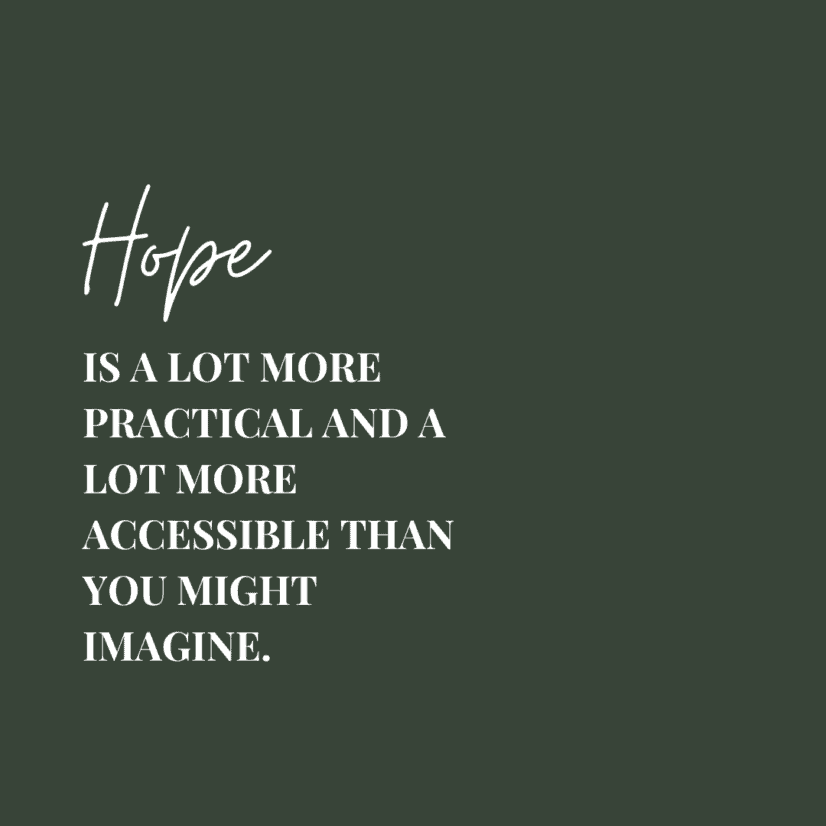The new year always brings with it the promise of something new…a fresh start.
But this question can linger in the background – what if this next year isn’t any better than the last? What if the pain continues? Then what?
The “then what” is the space between where we are and what is going to happen.
That space can be filled with a lot of things. One of them is hope. I know hope feels like a nice idea. A warm fuzzy emotion. Maybe a bit of optimism sprinkled with a little fairy dust. But I’ve got good news for you.
Hope is a lot more practical and a lot more accessible than you might imagine.
Hope is a muscle. When you go to the gym and start working out for the first time in a while, you feel exhausted and depleted. But the more you work out, the better you feel. The more you use the muscles, the stronger they get and the better you become at working out. Hope is the same way. The more we use it, the better we become at staying hopeful.
Hope is not mysterious. When we think about hope, it often seems unattainable and unclear. However, research has shown us that it’s the opposite – it’s easy to operationalize.
There are 3 parts: a goal, a pathway, and agency.
Goal. In order to be hopeful for something, we need a goal. If we don’t have a finish line of sorts, it makes it really difficult to know what we are working towards. So step one – Ask yourself, “What is my goal this year? What does my finish line in a specific area look like?” Of course you don’t have to stop there, but having a specific goal helps to motivate you and give you something to believe in.
Pathway. A pathway leads us from here to there. It’s the way we navigate the journey. It’s the process by which we traverse a course. So step two – ask yourself, “How am I going to get from here to there? What’s my path to the finish?” It’s here we have to acknowledge that not every step is within our control. On the journey, we will encounter things that are unexpected and often difficult. But having a pathway identified ahead of time will help us to navigate those things as they arise.
Your plan should have small steps – those are easier than big leaps. Make sure you ask for help – getting input from experts or people who have experiences helps you create a more successful plan. Create a “training” calendar – keeping track of your progress keeps you on track
Personal agency. Finally hope requires personal agency. Agency is the capacity we have to make our own choices. It’s the responsibility we have for our own actions. We can’t control the external world but we can make the next good decision given our options and resources.
Think about what goes into good decision making and where you get off track. After a year of challenges, most of us are probably feeling fatigued or overwhelmed. This is where good self-care comes in. We’re not going to be able to get to any finish line if we’re exhausted and depleted. Stop and think – what builds you up? How can you set some intentional time aside for you? What can you do that fills your tank?
Another thing I find gets in the way is what we are telling ourselves. If we’re focused on what we can’t do or what we can’t control, we’re mostly likely going to find that. But if we are celebrating our wins, focusing on our accomplishments (even the small ones), or reflecting on the things we’ve learned, we will be increasing our agency.
What are the positive things you will speak over yourself that are a result of the last year?
Maybe you develop a mantra that sounds something like this…”I’m a problem solver. I don’t give up. I’m stronger than I think I am. I’m resilient. In the face of challenges, I rise up.”
Working out isn’t easy. It takes time, decisions, effort, and energy. But the health benefits are worth it. Holding hope isn’t always easy, but the life benefits are most definitely worth it.
Set some goals for 2023 – finance, emotional health, health, relationships, hobbies, balance. You got this. Your finish lines await.
Written by: Dr. Wendy Dickinson

